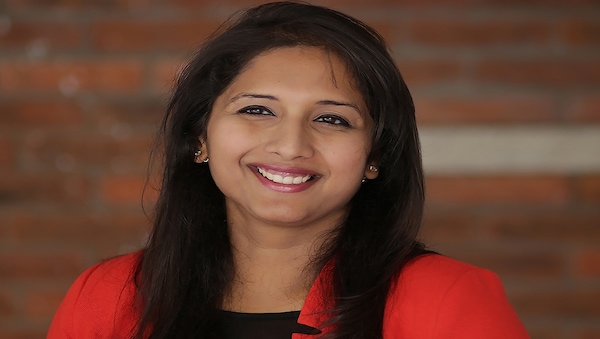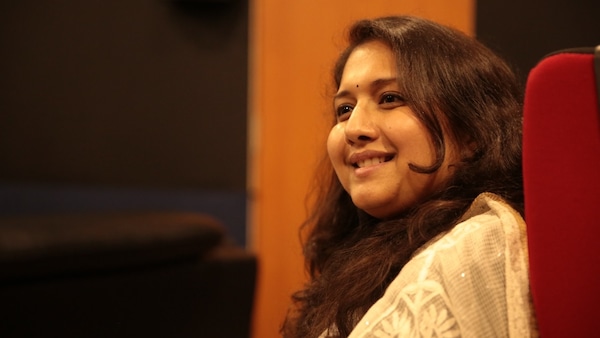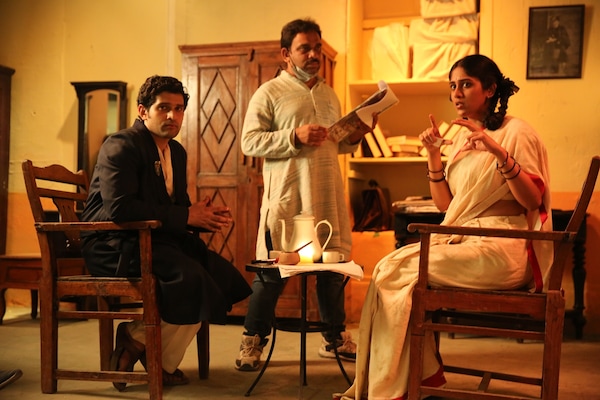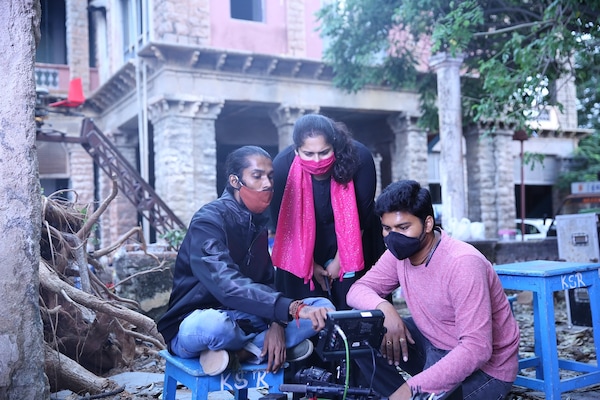Exclusive! Producer Radhika Lavu: Unheard is an ode to our forefathers, freedom fighters and their sacrifices
The founder of Ellanar Films, whose Telugu show Unheard premiered on Disney+ Hotstar recently, gets talking

Last Updated: 05.37 PM, Sep 20, 2021
The competitive nature of the show business demands producers who are creatively involved with a project as much as the content team. Radhika Lavu, the founder of Ellanar Films, is a producer who looks at stories beyond their financial feasibility, market relevance and strives to understand the creative vision of a filmmaker first. Having been a documentary filmmaker herself in the past, the Goldsmiths College, University of London passout asks a lot of questions to her directors until the projects go on floors. Once she gives a nod, there's no looking back.
Radhika places complete trust in the creator, the process and aspires to come up with content that ages well with time. It's not surprising that her production house came out with one of the best Telugu OTT shows, Gods of Dharmapuri, for ZEE5 besides helming a handful of corporate films, advertisements for the best brands in the business. The latest from Ellanar Films is Unheard, a pre-independence era show that portrays Hyderabad's role in the freedom struggle (that released on Disney+ Hotstar on September 17). Radhika Lavu elaborates on Unheard, the digital boom, the Telugu OTT market and more in a free-wheeling chat with OTTplay.com
Producers, to most of the filmmakers who come up with pitches, conventionally ask two questions - 'why do you think the audience will watch it now and why do you think the story needs to be told?' What made you say yes to Unheard?
We are in the 75th year of Independence. What bigger ode can we pay to our forefathers, freedom fighters than telling those unheard stories from our past? When this project came to me, I didn't even ask the question of 'why now?' to the writer, director Aditya, because I knew this was a story waiting to be told. It's the quickest that I've approved a project. It just blew my mind that this tale is not about history but philosophies, perspectives and appreciating our differences. I went through a lot of churning and inner questioning through his phase and I even started penning down what words like freedom, self-sacrifice, satyagraha meant to me. If I can feel this much, I was sure I could ignite some part of the spirit among audiences too.
How would you define freedom?
Freedom for me, translates to freedom of thought without barriers, without being judged. You can't talk to anyone without the fear of being judged, even if it is with your closest friends or family. Though they may mean a lot to you, there's still an aspect of judgement. I hope to talk without filters and still be treated the same. It's also during Unheard that I gave the freedom to my team to discuss anything under the sun and told them 'you won't be judged'. Even with my family, I have started inculcating that and it's a chain reaction. I realised it needs to start within myself first.
In terms of ambition, Unheard, a conversational show set in the pre-Independence era, is an unlikely yet challenging follow-up to your previous production (for ZEE5), Gods of Dharmapuri, something that was so massive in scale, cast, storytelling and expanse. Didn't you want to take up something lighter or something easier to execute instead?
No, I don't think so the expanse of a project affects me. It's the story that has to draw me in and convince me that I've to make it. It's the prospect of working as a team person and be involved in the filmmaking process in some form that excites me the most! A story may be great but the team needs to be equally excited about it. I knew there was something big expected out of me after the season one of Gods of Dharmapuri. I had a lot of scripts coming my way, I took my time despite many offers from investors, producers and OTTs. I sat back and wanted to be careful about my next move. I didn't want to succumb to any pressure and be cautious about what I do. I am an instinctive person and I trusted the vibe and my gut instinct with Unheard. As a filmmaker, my biggest strength is the unwavering focus I have on the stories I want to tell, regardless of the time taken to make it and it's something I'm proud of.

As a producer, a lot of your creative decisions are partially influenced by market surveys, viewership stats, metrics and trends in the OTT space. But with Unheard, you say your decision-making was quite instinctive. Could you explain how do you maintain a balance between market needs and instincts?
Initially, when I had ideas to make a feature film under my banner, I felt I had to wait for the market to open up to the kind of stories I want to tell. The digital market opened up soon and it evolved for a couple of years after which the metrics started to come in. With both my collaborators, ZEE5 and Disney+ Hotstar, there has always been a fine balance between the creative aspects and market needs. I have noticed the platforms give importance to the creators, the script as much as the metrics, viewership stats and trends. As a producer, it's important to know my audience; that's why surveys and metrics do matter. I can't tell the same story to the audiences on ZEE5 and Disney+ Hotstar.
What helped you trust a rank newcomer like KV Aditya for Unheard?
Conversations - it's as simple as it can get. I like to trust a person with their skill-set, something they would also nurture while making the project. I try to understand the fire in their belly, their passion to learn, if they are a team player and can accept differences of opinion. I and Aditya may have different opinions on various aspects but we tried explaining it to each other sportively.
Unheard's story is indeed intriguing. Hyderabad had to counter not one but two powerful forces including the British and the Nizams. This makes the city's story during the freedom struggle so unique.
Frankly, even I didn't know that. I was intrigued, astounded to hear from KV Aditya about Hyderabad being free only a year after independence. I was very curious to know what happened that year. The audiences get to know that in the fifth episode of Unheard when they watch it. I was curious to understand what Hyderabad as a city was going through at that time and know the perspectives of the common man in the freedom struggle. Hyderabad is very dear to me; it's a place I call home. It's a wonderful place to live, have a family and one that comes with a lot of historicity. The story of Hyderabad standing on its own feet in the country in a different era gave me goosebumps and I had to be a part of it at any cost.
Most Telugu films we have made around Independence have black-and-white characters. The British are the villains and the freedom fighter is the hero. There has been very little scope to explore the grey areas in our on-screen representation of the freedom struggle. Do you believe Unheard could change the norm?
The aspect of grey during the pre-independence era was very little. People had a very clear stance. Say, for instance, Padma in Unheard, is a Gandhian at heart, firm with what she believes and doesn't believe in. It was indeed a black and white era. With a few characters, though you may not see areas of grey, you see them evolve as individuals during the show's timeline (between the early 1900s and 1948). Chalapathi, a London-educated doctor in the story, initially believes that the freedom struggle isn't his fight and even questions Padma about her choice to not have a family. Even when he needs to check up on a person before he's hung, Chalapathi can't understand why someone needs to sacrifice themselves for a country. Before Hyderabad is declared free, he transitions into a peacemaker when a Nizam ally and a first world war veteran with different ideologies confront each other. The story doesn't try to tell if a character is good or bad, but suggests that they're a product of their experiences.

Isn't it sad that communal divide, just the like early 1900s, remains a reality of our society even today in a different form?
It's quite unfortunate that tolerance isn't a reality in India even after 75 years of independence. Tolerance seems an idea that is lost in many ways. With tolerance comes respect, acceptance of each other's differences. I always believe in the idea of shared empathy as a community and it's a space that we can walk towards. In our little own way with the characters in our show, we've shown how it's important to 'agree to disagree'. As a society, what we need to do is to look ahead and not look back. The next generation is going to be our children and grandchildren and we need to lay a foundation for them to live in a better society.

How different were your collaborations with ZEE5 and Disney+ Hotstar?
With ZEE5, it was extremely free and I've had the freedom to experiment, explore and they trusted my judgement with the story. I had the opportunity to learn along with them. Once we made the show, their confidence in us grew manifold and we're extending our association to several other projects in the future as well. With Unheard, I made the show first and sold it to Disney+ Hotstar later. I was yearning to make Unheard and I can say I was impatient (laughs). During post-pandemic, things were really slow and I wanted to take my time to make a quality show. Once I screened the show to Hotstar, it was an immediate yes. I was a little scared about the acceptance sans any obligations. I learnt a lot about the presentation of a show from Disney+ Hotstar and they're very practical in their understanding of the show business.
How has filmmaking and production in the web space changed before and after the pandemic?
In the pre-pandemic times, the most important factor for a show was content and not the genre. Gods of Dharmapuri was a gangster drama, a space that has been vastly explored by filmmakers across the globe. The familiarity was important, while the USP was the packaging and writing. With the post-pandemic boom in the digital space, the focus has shifted to the genre again. It's important to stand out amidst a sea of content. Unheard came to me as a one-liner, a conversational web drama and I saw it as a genre that hasn't been tried before. Experimenting with genres has become crucial now because no there's no dearth of content. I hope to make a show with the expanse of something like Crown one day. I have been getting offers from filmmakers across languages now and I feel happy to be a part of this space.
Subscribe to our newsletter for top content, delivered fast.

